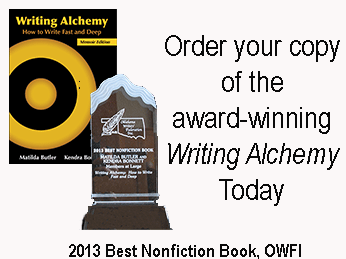 Post #24 – Memoir and Fiction, Writing Alchemy – Kendra Bonnett and Matilda Butler
Post #24 – Memoir and Fiction, Writing Alchemy – Kendra Bonnett and Matilda Butler
Have you ever told a story only to have it end with a dull thud? “Well, you had to be there,” you say in an effort to exit gracefully. But what went wrong? Do you know? Now, have you ever had the same thing happen in your writing? Has your memoir-in-progress fallen short of your expectations? Is something missing?
Memoir writing without a point is like letting the air out of the tire.
In graduate school, I had a professor who used to tease me about the way I would conclude my papers. “Kendra,” he said with a sigh, “it’s as if you just let the air out of the tire.” I always thought the audible sigh was him expressing the air escaping from my writing.
While I hated the criticism, it was a great metaphor. Furthermore, he was right. Fortunately or unfortunately, however, he left it to me to figure out why. And I confess it took me a few years to pinpoint the problem.
Sorry, but I’m going to leave you in suspense for the moment because I first want to explain why I’m writing this post and why I placed it within our Writing Alchemy category. As many of you know, Matilda and I have been working on our writing craft book, Writing Alchemy. And in case you’re wondering, yes, 2011 IS the year we will finally publish.
But there’s been method to our delay. As we continue to teach and share our Writing Alchemy technique with our students and those writers we coach, we look for the flaws both in our explanations and how we deliver the message. We’ve found a few although nothing too earth-shattering. Except for one. And that’s the point of this post. For it seems that the reason stories sometimes fail to connect and conclusions fizzle with all the lost expectation of a dud firecracker can be directly related to our efforts to improve our writing. The result: The writing just lays there like a lox…as the saying goes.
If you want your work to perk up like a perch…sorry, I couldn’t help myself…then prepare for the writing. You see, writers trying hard to improve their writing often get so involved with technique (ie., building characters, plumbing the depths of their emotion, painting vivid word pictures, and capturing ideas in dialogue) that they forget that a good story–a well-told story–is the essence of all creative writing. In other words, you have to have a point and a path for getting to the point.
So if you want your punchlines to land with a zing. If you want your memoir vignettes, short stories and articles to arrive at the last paragraph with tires fully inflated. If you want to write a successful memoir, spend as much time as you need thinking about the point of your story. Organize the narrative. Know why you’re writing. Figure out the message you want to leave with your readers. Identify your turning point.
With the story well in hand, you’re ready to work on the other elements of good writing…rich character development, vivid detail, deep emotion, strong dialogue and a sense of time and place.
Online Tools to Help the Memoir Writer
For some time now, I’ve been interested in creative variations on memoir and the online tools that help writers express their memoir vignettes in fresh, new ways. The six-word memoirs popularized by Smith Magazine is one. So too are the Google-YouTube Search Stories. Neither is a replacement for writing memoir, of course, but they can help you focus on the essence of your story. By stripping away everything else, you can zero in on the reason you’re writing. The message. The point of it all.
I’ve found a few more online tools for you to experiment with; have fun. Focus on your story. And don’t start writing your memoir until you’re sure you know why you’re writing and the message you want to share with readers. These tools may help you create a roadmap for your journey.
- There are several timeline tools that allow you to build an annotated chronology. One you might try is called OurStory.
- Maybe a visual mapping tool that allows you to pinpoint locations and develop a narrative is more to your liking. After all, time and place are key elements to storytelling. You might take a look at Wafaring.com.
- Storytelling has a long oral tradition. In keeping with that, take a look at PodcastPeople.
- If you really want to set free your inner artist, you can try Tabblo.com. It might just support the mixed media approach that’s right for you.
- Finally, if you haven’t yet tried creating a digital scrapbook, you’re in for a treat. Take a look at Cropmom.com or Scrapblog.com.
Matilda and I have our variation on the digital scrapbook. We call it ScrapMoir, and it’s the subject of our Thursday posts. Our resident expert on the subject is scrapbook memoirist Bettyann Schmidt. Bettyann’s created a new product that we’ll be introducing this Thursday. So be sure to check back. Shhhhh! It’s a secret; pass it on.
storytelling
writing tip
writing alchemy
story arc

















